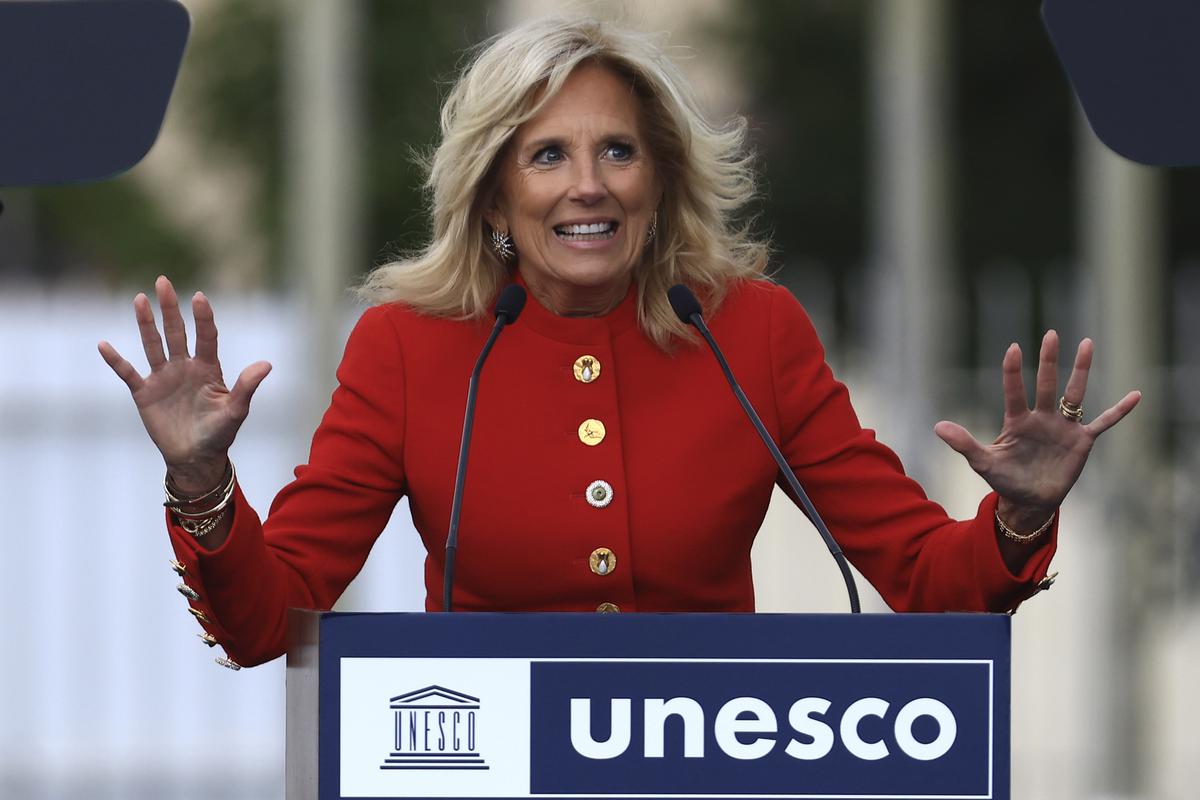
A Proud Return to UNESCO Membership
The rejoining of the United States to UNESCO after a long absence was a moment that filled hearts with pride and hope. First Lady Jill Biden, representing the nation on this auspicious day, emphasized the country’s renewed commitment to international cooperation in the fields of education, science, and culture.
Celebrating Cultural Diversity and Collaboration
The flag-raising ceremony held at UNESCO’s headquarters in Paris celebrated the values of cultural diversity, mutual understanding, and collaboration among nations. The historic event brought together dignitaries, scholars, and representatives from various countries, all united in their belief in the power of education and culture to bridge gaps and foster peace.
Renewed Commitment to Education and Learning
As the First Lady gracefully unfurled the American flag at the ceremony, she underscored the significance of education and its role in shaping a better future for the world. The United States’ return to UNESCO is a strong affirmation of the country’s commitment to supporting educational initiatives and empowering individuals through knowledge.
UNESCO’s Noble Objectives
UNESCO, founded in 1945, has remained steadfast in its commitment to promoting peace and security through international collaboration in education, science, and culture. Its diverse range of projects includes literacy programs, support for marginalized communities, preservation of cultural heritage sites, and fostering scientific cooperation on critical global challenges.
Promoting Peace through Education
Education has always been a cornerstone of progress and development. By investing in education worldwide, UNESCO aims to promote peace and understanding among nations. Through educational opportunities, UNESCO empowers individuals, reduces poverty, and builds bridges between cultures.
Preserving Cultural Heritage
Cultural heritage sites embody the rich history and traditions of civilizations across the globe. However, many of these sites face the threats of neglect, natural disasters, and human conflicts. UNESCO’s World Heritage program endeavors to safeguard these iconic landmarks for future generations and to recognize their universal value.
Advancing Scientific Cooperation
In a world grappling with complex challenges, scientific cooperation is vital. UNESCO facilitates collaboration among countries in research and innovation to address issues such as climate change, public health, and sustainable development. By bringing together minds from diverse backgrounds, UNESCO strives to find effective and sustainable solutions.
A Long Road Back: U.S. and UNESCO Relations
The relationship between the United States and UNESCO has seen its share of ups and downs. While the U.S. was a founding member of the organization, it withdrew its membership in 1984, citing concerns over financial management and political differences. However, over the years, there has been a growing recognition of the importance of international collaboration in addressing global challenges.
A New Chapter of Cooperation
The decision to rejoin UNESCO marks a new chapter in U.S. foreign policy, one that seeks to re-engage with the international community and embrace multilateralism. First Lady Jill Biden’s presence at the flag-raising ceremony serves as a symbol of the country’s commitment to working hand-in-hand with other nations for a brighter future.
The Role of Soft Diplomacy
Cultural exchange and cooperation have the power to transcend borders and foster goodwill among nations. Soft diplomacy, as exemplified by UNESCO’s initiatives, allows countries to build lasting relationships based on mutual respect and understanding. Such efforts can have a profound impact on shaping a positive image of nations on the global stage.
A Message of Unity and Hope
The flag-raising ceremony in Paris sends a powerful message of unity, hope, and optimism. It symbolizes the United States’ desire to play an active role in international affairs and its recognition of the value of collaborative efforts in addressing global challenges. As the world grapples with pressing issues, including climate change, poverty, and pandemics, cooperation among nations has never been more critical.
Conclusion
The flag-raising ceremony in Paris, led by First Lady Jill Biden, marks a significant moment in the history of international cooperation. The United States’ return to UNESCO demonstrates a commitment to education, science, and culture as essential pillars of a harmonious world. Through collaborative efforts and soft diplomacy, UNESCO continues to make strides in promoting peace, preserving cultural heritage, and advancing scientific cooperation. As the world navigates an ever-changing landscape, the need for multilateralism and mutual understanding remains paramount. The ceremony stands as a testament to the power of unity and hope in shaping a brighter future for all of humanity.









